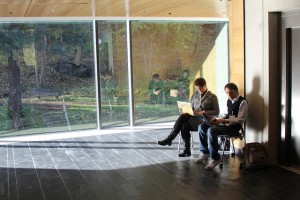Report From Internet Research 11
Last week, I joined 250 international scholars in Gothenburg, Sweden for Internet Research 11, the 2010 conference of the Association of Internet Researchers. The conference theme – Sustainability, Participation, Action – carried over into the emphasis on producing a greener academic conference, with programs available on USB sticks and an all-organic menu. IR 11 is wildly interdisciplinary, tied together largely by research topic, leading to a number of fascinating connections, disjunctures, and challenges. With up to seven concurrent sessions, however, my experience is obviously only a partial view of the work being done.
On Thursday, I began with a panel on user-generated culture, which included presentations on material fan practices that cross into the online, Chinese fans of US television, YouTube memes, and fan-made film trailers. Limor Shifman drew our attention to the role of the interent not just as paradise for memes, but “paradise for meme researchers,” who can more easily follow the flows of cultural material, and Kathleen Williams expanded on this theme by using spatial frameworks to understand the expansion of fan-made film trailers. Afterwards, the roundtable on “Sustainable Entertainment” offered a range of academic and industrial perspectives on what makes entertainment media sustainable, and how online content and distribution channels may contribute to sustainability. Featuring Jean Burgess, Mia Consalvo, Patrick Wikström, Martin Thörnkvist of music label Songs I Wish I Had Written, Wenche Nag of TelNor, and convened by Nancy Baym, the roundtable addressed the possibilities for the music industry, particularly the possible roles for services such as Spotify, in reframing the possibilities for sustainable entertainment careers, as well as the changing games industry, the challenges of creating the variety and change that sustain systems of culture, and the persistent question of e-waste and the materiality of the digital.
This question of sustainable ICT in terms of devices, hardware, and labor was revisited in Friday’s keynote by Peter Arnfalk of Lund University in Sweden. Arnfalk discussed both the greening of IT (making technology more environmentally friendly) and greening through IT (using technology to reduce the environmental impact of other activities). The audience, via Twitter (hashtag #ir11), appeared struck by the statistics that attempted to concretize the impact of technology – one Google search emits 0.2 grams CO2, and ICTs account for 2% of total CO2 emissions. Arnfalk went on to discuss the European and Swedish experiences with addressing green IT through business and policy channels in the past 15 years.
The final keynote featured Nancy Baym discussing the evolution of media production, distribution, and fandom in light of the internet. Starting from her personal interest in, appropriately, Swedish pop music, she went on to address the “Swedish Model” more broadly, as music labels attempt to work with the decentralization in music, sharing their products freely rather than clinging to old models. This involves looking for new possible revenue streams, including making money from sources other than listeners and fans, and seems to foster the rise of a “middle-class musician,” who can attain mild success in a diverse mediascape. The role of social media was addressed in terms of the relative rewards for fans and audiences, and Baym closed by asking whether this new landscape means academics need to interrogate our notions of “fans,” “audiences,” and “community.”
Facebook was omnipresent – presenters addressed surveillance, identity and personal branding, community, and of course, privacy. Michael Zimmer proposed that the “laws of social networking,” and its business imperatives, lead to a desire to “make privacy hard,” and thus attempting to influence Facebook’s privacy policies may no longer be possible. Instead, he suggested moving forward through channels of government regulation, developing alternate technologies, or encouraging media literacies. Alice Marwick and danah boyd discussed their recent fieldwork with American teenagers, who increasingly treat Facebook as a hyper-public space (“shouting to a crowd”) and turn to hiding their messages from parents while sharing with peers (steganography), or using alternatives such as private Twitter accounts (“talking in a room”).
AoIR also seems to be developing a robust games community, featuring a handful of dedicated sessions and the inclusion of games research in a variety of panels. While MMOs, particularly World of Warcraft, were central to many of the papers presented, scholars also addressed casual online gaming, game cultures that extend beyond the game space, digital distribution of games, gaming in social networking sites, and console games such as Left for Dead. Questions of identity, affect, and power within gaming spaces crossed between panels and conversations.
Finally, Friday’s roundtable on the futures of academic publishing combined exciting possibilities and success stories with warnings about the inherent unsustainability of the current US system of journal and book publishing as it relates to defunding university libraries, tenure and promotion, and the peer review system. Participants included Nicholas Warren Jankowski, Clifford Tatum, Steve Jones, Alex Halavais, Kathleen Fitzpatrick, Siva Vaidhyanathan, and Stu Shulman. Projects such as Media Commons and open peer review were discussed, as were the possibly changing roles of journals and books in an era of self-publishing and alternative forms of scholarly conversation. Panelists advocated writing for more popular audiences – or at least making scholarship accessible outside the academy – as well as the necessity of senior scholars participating in new publishing forms and of all of our active participation in reforming journal hierarchies and the standards by which tenure and promotion are determined.




[…] Here’s another AoIR roundup – a nice one, at that – from Liz Ellcessor of the University of […]